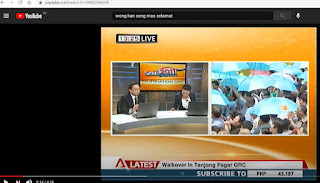Be Careful of Who You Underestimate
I’ll be the
first to admit that I am by no accounts a winner of the open free market
system. Despite what some of my fans on Tremeritus would think, I am not making
millions as a “General” in the ruling party’s brigade (If I really had
millions, I’d like to know where it all went to) and in 20-odd years of being
in the work force, I’ve only had a single steady job (defined as full
employment for more than a year) and that’s for my current employer, which is a
small accounting practice. As I approach fiftieth birthday, I’m resigned to the
reality that I’ll probably never make much (Resigned to die without the
millions that the Tremeritus crowd imagine me making).
Yet, despite my
lack of material success, I’ve made sure that I’ve never given to the attitude
that my plight was due to people from elsewhere, particularly from poorer parts
of the Asian continent. A few people I know have questioned why I’ve never taken
a more aggressive stance towards “open door” immigration and my answer has
always been two-fold.
Firstly, assigning
the blame for my plight to people from elsewhere is an act of giving power to
those said people. I d appreciate that there are times when there are circumstances
beyond ones control This pandemic is an example. In my personal life, it’s not
my fault that restaurants cannot take dine in customers and therefore do not
need waiters. Hence, I have no waiter side gigs.
However, with
notable exceptions, I believe that we have more power over careers than we may
think and I don’t see why I should assign blame and therefor power over my own
destiny to someone else. If certain things aren’t working out the way I expect
them to, I like to think that it’s my responsibility to change my situation.
Sure, I might have been denied the corner office in some bank because they
hired a load of Indian nationals, but instead of complaining that the job was “stolen”
(I really understand how jobs are ‘stolen’ in as much as I never knew one could
own a job) I turned what little experience I had and sold services to the
Indian national community. Didn’t make me rich but it gave me a decent enough
profile and paid my bills. I will never stop repeating the fact that the one
time I pitched for a government related job as an individual, it was the Indian-born
member of the board who fought for my right to be get heard. The local born chairman
of the board tried to snub me for lacking either government or multinational
experience.
The second
point on why I’ve resisted going down the road of assigning blame for my plight
is that it makes us fall into the trap of complacency when it comes to dealing
with people from the “developing” world. If you read enough online complaints
about people from India and China, you’ll find that there’s a common thread –
namely the fact that these people are hired because they’re cheap and the “greedy”
corporations and government would rather hire cheap but shoddy Indian and
Chinese labour over hard working but slightly more expensive Singaporeans. Stories
over “bad behavior” then compound matters. The stories are not limited to
Singapore. They are also there in Hong Kong and Taiwan about our “ethnic cousins”
from the mainland.
Nobody is denying
that there are plenty of awfully behaved PRC nationals running around the
place. Nobody is denying that China built its initial boom on cheap and polluting
manufacturing and India is well renown for “cheap” programmers and call
centres.
However, to
write-off people from less developed nations as being merely “cheap” labour
gives one a sense of false security. The “false sense of security” that
Singaporeans, Hong Kongers and Taiwanese feel towards their Mainland cousins’ discounts
one of the most crucial factors in any development scenario – namely the value
of “hunger.”
Sure, people in
Singapore and Hong Kong speak better English (international language of trade)
and are familiar working with the West (not to mention more trusted – nobody worries
Singapore will steal secrets, everyone assumes China will). However, these
advantages will not last forever and hungry people will find ways to catch up
and negate whatever advantages we have.
I noticed this
in an article on Bloomberg, which mentioned that Old School Hong Kong Tycoons
were being left behind by their mainland Chinese counterparts. What’s
particularly interesting about this article is the fact that it pointed out
that Hong Kong’s original tycoons made their money from cahoots with the Hong
Kong Government to control the scarcest commodity – land. The Mainland Chinese counterparts
by contrast did it in far more innovative industries like e-commerce. The
article can be found at:
https://finance.yahoo.com/news/old-school-tycoons-made-hong-210000897.html
Hong Kong’s
richest remain property developers. Of the Hong Kong rich, only the 92-year-old
Li Ka Shing made an attempt to diversify beyond Hong Kong real estate (a good
portion of his increase in fortune came from being a backer of “Zoom”). A list
of Hong Kong’s richest can be found at:
https://www.forbes.com/hong-kong-billionaires/list/#tab:overall
What is true of
Hong Kong is also true of Singapore. However, there’s a particular Singaporean
twist to the wealth list. It’s based on the fact that our government has worked
on the premise that the “super rich,” are wealth and job creators. So, if you
look at the top four wealthiest, you’ll notice that they came from elsewhere
and in the case of Eduardo Saverin, one of the founders of Facebook, he made
his money elsewhere and has merely settled in Singapore. The richest “local”
fortunes are primarily old school property developers who made their money from
working with the government over the control of land.
https://www.forbes.com/singapore-billionaires/list/#tab:overall
In the case of
both Hong Kong and Singapore, the path to wealth was very simple – ensure you’re
well connected and get in on juicy real estate deals. Both city-states are
undoubtedly very prosperous but the question remains – how much of that
prosperity has actually benefited normal people.
Taiwan, or the “other
China” seems to have grown its wealth beyond the “crony” sectors of real
estate. They’ve done in the “hardware” industries and if you look at the rise
of China as a manufacturing hub, you’ll find that a good portion of that
investment came from Taiwan. Foxconn, which makes iPhones in China is
controlled by Terry Gou, a Taiwanese businessman.
https://www.forbes.com/taiwan-billionaires/list/#tab:overall
However, while
Taiwan has done things beyond the “crony” sectors of real estate, the hard
industries that they specialize in have been primarily in making things cheaper
than what the West and Japan can do.
China by contrast,
does seem to have room to grow wealth in innovative sectors, even if the
current government has felt the need to take its tech tycoons down a peg or two
as witnessed by the cancellation of the IPO of Ant Financial as this list of
China’s richest indicates:
https://www.forbes.com/china-billionaires/list/#tab:overall
Sure, China’s
tech tycoons have been helped by the fact that China banned many of the Western
tech companies from entering the market and so they’ve had a certain amount of
protection. China also has a huge domestic market and is less reliant on
exports than the other three. A Singapore business needs to look beyond
Singapore’s less than ten million market. A local Chinese business merely needs
a fraction of the Shanghai Market to do well.
However, this
is not to say that home made Chinese technology is to be sniffed at. Despite
being a Communist state, China made platforms like Tick Tock have done
something that International (read – Western or specifically American) platforms
like Facebook have not done – namely provided an avenue for content creators to
make money. As the following article suggests – the “evil” communist
dictatorship does get the need to encourage creativity and innovation if it is
to compete on the global scale. More can be found at the following article:
https://www.theinformation.com/articles/why-china-embraced-the-creator-economy-before-the-west-did
All this is not
to say that China is saintly. Leaving aside the geopolitical risk of conflict
with the Western world, there are risk from the business point of view. The
Communist Party’s recent crackdown on the tech sector is one of them. Who wants
to invest in a place where the state can one day arbitrarily take things away
from you?
However, while
all these things are true, it would be a danger to underestimate people from
China and other “developing” nations are “cheap” fodder for capitalist system. Firstly,
as many of us in Singapore and Hong Kong are realizing, our systems that made us
rich are in many ways “crony” and don’t add any real value to the scheme of
things. Then there’s the fact that our Mainland Cousins and other people from
developing world are hungry and they’re willing to use their wits to create a
world that works for them. As Bill Maher says, “They’ve eaten our lunch and
they’ll be hungry in about an hour or so.” The sooner we learn to work with it,
the better it is for the rest of us.



























